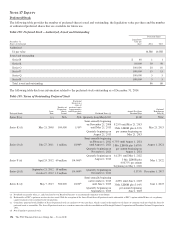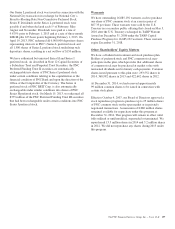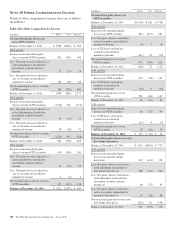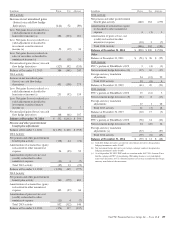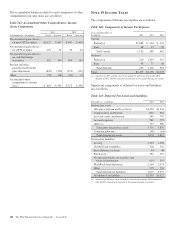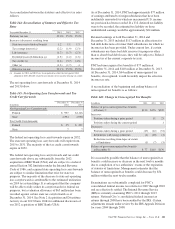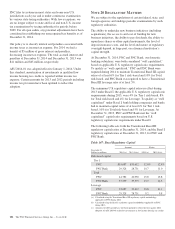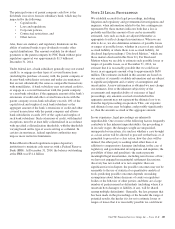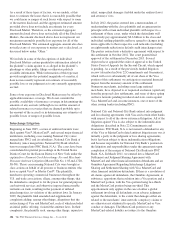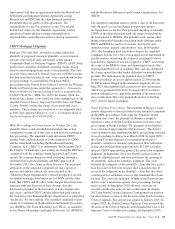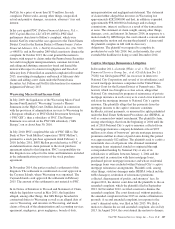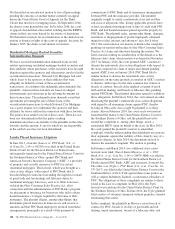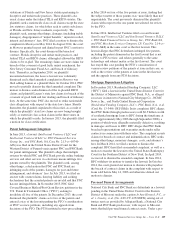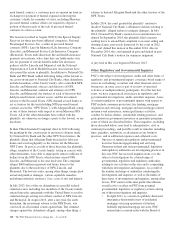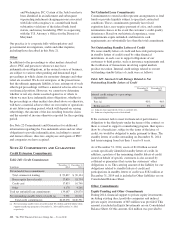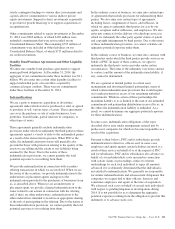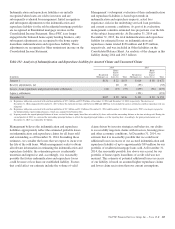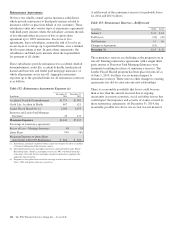PNC Bank 2014 Annual Report Download - page 224
Download and view the complete annual report
Please find page 224 of the 2014 PNC Bank annual report below. You can navigate through the pages in the report by either clicking on the pages listed below, or by using the keyword search tool below to find specific information within the annual report.
after the other plaintiff voluntarily dismissed his case, the
remaining plaintiff filed a motion for leave to amend his
complaint in the trial court. The plaintiff’s remaining claims,
as reflected in the proposed amended complaint, relate
exclusively to the loan discount fee.
Overdraft Litigation
Beginning in October 2009, PNC Bank, National City Bank
and RBC Bank (USA) have been named in lawsuits brought as
class actions relating to the manner in which they charged
overdraft fees on ATM and debit transactions to customers
and related matters. All but two of these lawsuits, both
pending against RBC Bank (USA), have been settled. The
following is a description of the remaining pending lawsuits.
The pending lawsuits naming RBC Bank (USA), along with
similar lawsuits pending against numerous other banks, have
been consolidated for pre-trial proceedings in the United
States District Court for the Southern District of Florida (the
“MDL Court”) under the caption In re Checking Account
Overdraft Litigation (MDL No. 2036, Case No. 1:09-MD-
02036-JLK ). A consolidated amended complaint was filed in
December 2010 that consolidated all of the claims in these
MDL Court cases. The first case against RBC Bank (USA)
pending in the MDL Court (Dasher v. RBC Bank (10-cv-
22190-JLK)) was filed in July 2010 in the United States
District Court for the Southern District of Florida. The other
case against RBC Bank (USA) ( Avery v. RBC Bank (Case
No. 10-cv-329)) was originally filed in North Carolina state
court in July 2010 and was removed to the United States
District Court for the Eastern District of North Carolina before
being transferred to the MDL Court. An amended complaint
was filed in Avery in August 2010.
These cases seek to certify multi-state classes of customers for
the common law claims described below (covering all states in
which RBC Bank (USA) had retail branch operations during the
class periods), and subclasses of RBC Bank (USA) customers
with accounts in North Carolina branches, with each subclass
being asserted for purposes of claims under those states’
consumer protection statutes. No class periods are stated in any
of the complaints, other than for the applicable statutes of
limitations, which vary by state and claim.
The customer agreements with the plaintiffs in these two cases
contain arbitration provisions. RBC Bank (USA)’s original
motion in Dasher to compel arbitration under these provisions
was denied by the MDL Court. This denial was appealed to
the United States Court of Appeals for the Eleventh Circuit.
While this appeal was pending, the United States Supreme
Court issued its decision in AT&T Mobility v. Concepcion,
following which the court of appeals vacated the MDL
Court’s denial of the arbitration motion and remanded to the
MDL Court for further consideration in light of the
Concepcion decision. RBC Bank (USA)’s motion to compel
arbitration, now covering both Dasher and Avery, was denied
in January 2013. We appealed the denial of the motion to the
United States Court of Appeals for the Eleventh Circuit,
which, in February 2014, affirmed the order of the district
court denying arbitration. We filed a motion asking the court
of appeals to reconsider its decision, which it denied in March
2014. In April 2014, we filed a motion asking the court of
appeals to stay its ruling pending the filing of a petition for a
writ of certiorari with the U.S. Supreme Court. The court of
appeals granted our motion later in April 2014 and stayed its
ruling until July 2014. We filed a petition for a writ of
certiorari in June 2014, which was denied in October 2014.
Accordingly, the stay of the court of appeals’ ruling is no
longer in effect. In December 2014, we filed a motion to
dismiss the complaint.
The complaints in each of these lawsuits allege that the banks
engaged in unlawful practices in assessing overdraft fees
arising from electronic point-of-sale and ATM debits. The
principal practice challenged in these lawsuits is the banks’
purportedly common policy of posting debit transactions on a
daily basis from highest amount to lowest amount, thereby
allegedly inflating the number of overdraft fees assessed.
Other practices challenged include the failure to decline to
honor debit card transactions where the account has
insufficient funds to cover the transactions.
The plaintiffs assert claims for unconscionability; unjust
enrichment; and violation of the consumer protection statute
of North Carolina. In the Dasher complaint,the plaintiffs also
assert claims for a breach of the covenant of good faith and
fair dealing and for conversion. The plaintiffs seek, among
other things, restitution of overdraft fees paid, unspecified
actual and punitive damages (with actual damages, in some
cases, trebled under state law), pre-judgment interest,
attorneys’ fees, and declaratory relief finding the overdraft
policies to be unfair and unconscionable.
Fulton Financial
In 2009, Fulton Financial Advisors, N.A. filed lawsuits against
PNC Capital Markets, LLC and NatCity Investments, Inc. in
the Court of Common Pleas of Lancaster County,
Pennsylvania arising out of Fulton’s purchase of auction rate
certificates (ARCs) through PNC and NatCity. Each of the
lawsuits alleges violations of the Pennsylvania Securities Act,
negligent misrepresentation, negligence, breach of fiduciary
duty, common law fraud, and aiding and abetting common law
fraud in connection with the purchase of the ARCs by Fulton.
Specifically, Fulton alleges that, as a result of the decline of
financial markets in 2007 and 2008, the market for ARCs
became illiquid; that PNC and NatCity knew or should have
known of the increasing threat of the ARC market becoming
illiquid; and that PNC and NatCity did not inform Fulton of
this increasing threat, but allowed Fulton to continue to
purchase ARCs, to Fulton’s detriment. In its complaints,
Fulton alleges that it then held ARCs purchased through PNC
for a price of more than $123 million and purchased through
206 The PNC Financial Services Group, Inc. – Form 10-K


